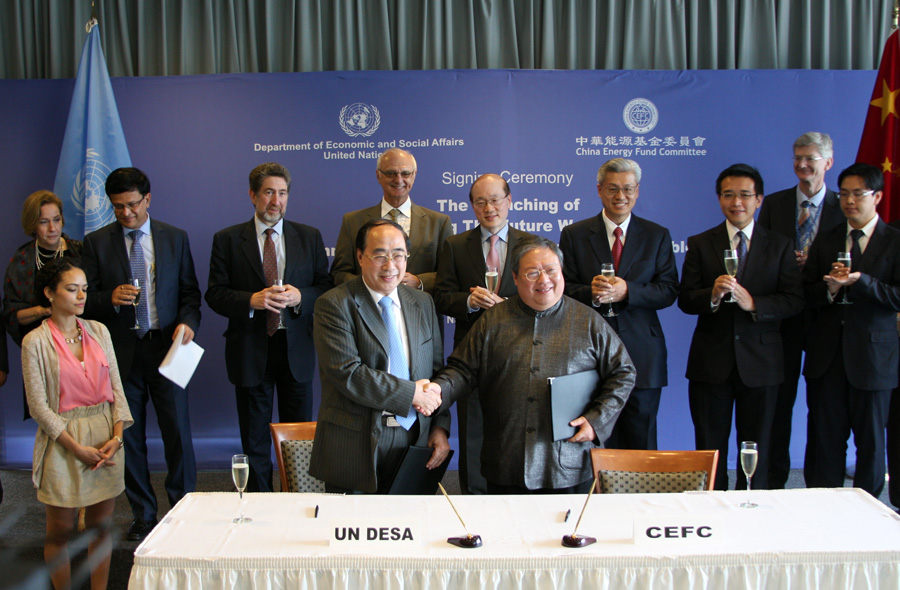UN energy program to lift China fund
Updated: 2014-07-19 08:34
By JACK FREIFELDER in New York(China Daily USA)
|
 Wu Hongbo (left, front), under-secretary-general for UN Department of Economic and Social Affairs, and Patrick Ho, deputy chairman and secretary general of China Energy Fund Committee shake hands after signing a sustainable energy initiative at the UN Headquarters in New York on Friday. JACK FREIFELDER / CHINA DAILY
|
A sustainable development and sustainable energy initiative launched by the United Nations and a Hong Kong-based think tank could be a boost to relationships between the UN and non-governmental organizations (NGOs) in developing countries, including China, according to an official with the China Energy Fund Committee (CEFC).
On Friday, the UN's Department of Economic and Social Affairs (UN-DESA) held a signing ceremony for the new proposal with the CEFC, which calls for an annual donation of $1 million to encourage helpful practices for building energy sustainability capacity in developing countries.
Patrick Ho, secretary-general of the CEFC, said it was an opportunity to bring energy sustainability issues to the forefront.
The CEFC is a non-profit organization focused on global energy issues and serves as a consultant to the UN, Ho said.
"Of course, we want to develop relationships on different levels but by having an initiative like this we can really steer the UN into an area that will be of concern for developing nations," Ho said Friday in an interview with China Daily. "We hope to bring together developing nations, but as a useful experience and a learning exercise.
"It will build these countries' capacities for addressing the important issue of energy sustainability," he said.
More than 100 guests attended the launch event on Friday, including UN-DESA representatives, CEFC members and other invited guests. The program included comments from Wu Hongbo, UN under secretary general for economic and social affairs, and Liu Jieyi, China's ambassador and permanent representative to the UN.
The jointly launched initiative is a follow-up to a June 2012 United Nations Conference on Sustainable Development, also known as the Rio+20 summit.
At Rio+20, member states acknowledged the need to reinvigorate a global partnership for sustainable development, which could be achieved, in part, by working with major groups to address major "implementation gaps", according to Hongbo.
"One of the implementation gaps is that we do not know very well the best practices [for sustainable development] in the world," Hongbo said. "That should be disseminated, shared and learned from.
"One way of doing that is to set up a grant, as we are doing now, to encourage all those countries — including the policymakers and also practitioners on the ground — to be aware that there are best practices in certain areas they can learn from," he said.
Liu said the discussion around the need for more concrete progress on energy initiatives is "a very important exercise".
"In China, we are developing clean energy initiatives on a scale unparalleled in history," Liu said at the signing ceremony. "We are developing new energy, renewable energy and clean energy in the hope of building what we term an environment friendly and resource-conserving society.
"So it is highly important that developing countries move hand-in-hand with the rest of the international community," he said. "No country should be left behind."